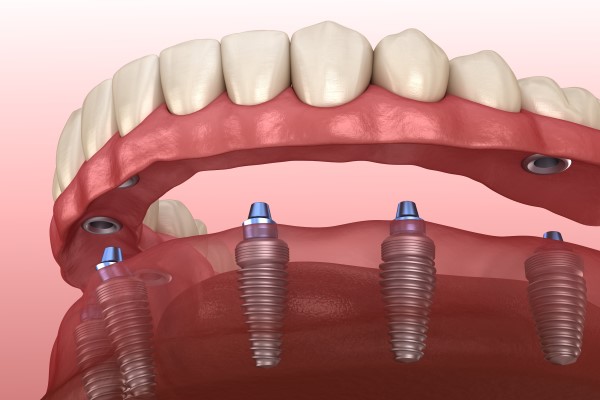Differences Between Implant Supported Dentures and Traditional Dentures

If you are missing teeth, you may assume that your only options are receiving implants or dentures from your dentist. A recent option to replace missing teeth is a combination of the two strategies: implant-supported dentures.
There are some situations in which traditional dentures are better and others in which the implant-supported variety would provide greater benefit. To help you reach an informed decision that suits your dental health needs, here is an explanation of how the two tooth replacement options differ.
6 ways that traditional and implant-supported dentures are different
Traditional dentures rest on the gums and are removable. They are typically held in place with a combination of denture adhesive and suction. Implant-supported dentures are anchored to titanium screws inserted directly into the jawbone. They are permanently fixed in the mouth and cannot be removed except by a dentist. As a result of this fundamental difference between the two, each has different effects.
1. Changes in the mouth
When the teeth are missing, the jaw undergoes a process called resorption in which the bone becomes less dense and the calcium is redistributed to build up bones elsewhere in the body. As a result, the jaw changes shape, making the face appear more sunken. The implants placed in the jaw stimulate the bone similar to the way that the roots of the teeth do, preventing changes to the mouth and face from resorption.
2. Permanence
With traditional dentures, changes to the jaw due to resorption prevent them from fitting properly over time. As a result, you need to have them replaced approximately every five to seven years. Dental implants are permanent and should last you the rest of your life.
3. Care
You need to care for both implant-supported and traditional dentures properly to get the most use out of them. However, the care regimen is different for each. Traditional dentures need to be taken out for cleaning and soaked in a solution while you sleep. Implant-supported dentures can be brushed and flossed like natural teeth.
4. Function
Traditional dentures have been known to slip while eating or speaking. Sometimes they fall completely out of the mouth. The acrylic palate of the upper plate helps to keep it more stable than the lower plate. However, because it forms a barrier between the roof of your mouth and food particles, it can affect the way your food tastes. Implant-supported dentures are more secure in the mouth and unlikely to slip. There is no need for an artificial palate, so the dentures do not interfere with your taste perception as you eat.
5. Cost
Traditional dentures have been available for centuries. Though they have undergone some improvements over the years, the basic concept remains the same. Therefore, they are the less expensive option. Implant-supported dentures represent a relatively new innovation that is only a few decades old. That combined with the method of placing them surgically makes them more expensive.
6. Treatment timeline
It takes months to recover sufficiently from the implant surgery to have the dentures installed. Conversely, traditional dentures are ready within a matter of weeks.
Frequently asked questions about implant-supported dentures
If you are considering implant-supported dentures, you likely have questions and concerns about the placement process as well as your candidacy for this type of denture. Read through the FAQs to learn more.
How do I know if I am a good candidate for implant-supported dentures?
Patients who receive implants need to have solid bone underneath the gums to support them. If you have no gum or bone disease, you have several missing teeth, and you dislike traditional dentures, you may be a good candidate for this procedure. Speak with your dentist to confirm and to learn more.
Can I switch from traditional dentures to implant-supported dentures?
Yes, you can. If you are tired of caring for traditional dentures or they do not work for you, it is possible that implant-supported dentures will be more suitable. Your dental care may be quicker and easier after switching to implant-supported dentures, which can feel like natural teeth.
Conclusion
Traditional dentures cost less and take less time to receive. Implant-supported dentures are more similar to natural teeth in feel and function. If you want to make a long-term investment in your oral health, consider asking your dentist whether implant-supported dentures are the right for you.
You may find that you are willing to spend more money on higher-quality dentures now for the eventual payoff. Remember that the implant-supported type is more expensive and takes longer to place than traditional dentures, but the benefit is that they do not require as much everyday care and often look more like natural teeth.
Request an appointment here: https://frankforddentalcare.com or call Frankford Dental Care at 2153021746 for an appointment in our Philadelphia office.
Check out what others are saying about our dental services on Yelp: Implant Supported Dentures in Philadelphia, PA.
Recent Posts
One option for someone who is missing teeth is implant supported dentures. It is important to fill in gaps in the mouth; not doing so has a variety of unwanted consequences. In the short term, a missing tooth often leads to pain, as the nearby teeth will start to shift. In addition, these teeth are…
The implant-supported dentures process can take anywhere from six months to a year to complete. The time it takes to get implant-supported dentures depends on a variety of factors and is unique for every patient. During the first visit with a dentist (the consultation), they can provide a tentative timeline for how long the process…
Considering implant supported dentures? This treatment is one that has grown in popularity as it offers a hybrid approach to replacing entire arches of missing teeth. Combining dental implant placement with conventional dentures, patients are able to successfully replace teeth that have been lost to decay. One question that often arises when considering tooth replacement…
You may have heard of the classic traditional dentures, but you may not realize that there are other, more stable options out there, like implant supported dentures. While conventional dentures rely on the gums and mouth muscles for support, implant supported dentures (as their name suggests) are attached to and supported by implants in the…


